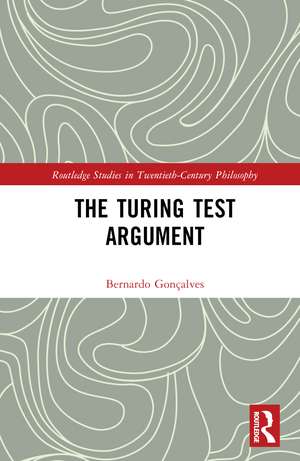The Turing Test Argument: Routledge Studies in Twentieth-Century Philosophy
Autor Bernardo Gonçalvesen Limba Engleză Hardback – 12 dec 2023
It reconstructs a controversy in England, 1946–1952, over the intellectual capabilities of digital computers, which led Turing to propose his test. It argues that the Turing test is best understood not as a practical experiment, but as a thought experiment in the modern scientific tradition of Galileo Galilei. The logic of the Turing test argument is reconstructed from the rhetoric of Turing’s irony and wit. Turing believed that learning machines should be understood as a new kind of species, and their thinking as different from human thinking and yet capable of imitating it. He thought that the possibilities of the machines he envisioned were not utopian dreams. And yet he hoped that they would rival and surpass chauvinists and intellectuals who sacrifice independent thinking to maintain their power. These would be transformed into ordinary people, as work once considered 'intellectual' would be transformed into non-intellectual, 'mechanical' work.
The Turing Test Argument will appeal to scholars and students in the sciences and humanities and all those interested in Turing's vision of the future of intelligent machines in society and nature.
Din seria Routledge Studies in Twentieth-Century Philosophy
- 9%
 Preț: 866.51 lei
Preț: 866.51 lei - 15%
 Preț: 396.61 lei
Preț: 396.61 lei -
 Preț: 381.38 lei
Preț: 381.38 lei - 9%
 Preț: 1038.24 lei
Preț: 1038.24 lei - 18%
 Preț: 1059.00 lei
Preț: 1059.00 lei - 18%
 Preț: 1003.99 lei
Preț: 1003.99 lei - 21%
 Preț: 269.60 lei
Preț: 269.60 lei - 18%
 Preț: 892.33 lei
Preț: 892.33 lei -
 Preț: 494.54 lei
Preț: 494.54 lei -
 Preț: 380.74 lei
Preț: 380.74 lei - 18%
 Preț: 1001.87 lei
Preț: 1001.87 lei -
 Preț: 387.27 lei
Preț: 387.27 lei -
 Preț: 487.37 lei
Preț: 487.37 lei -
 Preț: 389.66 lei
Preț: 389.66 lei - 18%
 Preț: 1117.43 lei
Preț: 1117.43 lei -
 Preț: 380.63 lei
Preț: 380.63 lei - 13%
 Preț: 334.55 lei
Preț: 334.55 lei - 26%
 Preț: 765.40 lei
Preț: 765.40 lei -
 Preț: 383.12 lei
Preț: 383.12 lei -
 Preț: 389.66 lei
Preț: 389.66 lei - 18%
 Preț: 1001.87 lei
Preț: 1001.87 lei -
 Preț: 415.24 lei
Preț: 415.24 lei - 18%
 Preț: 1001.24 lei
Preț: 1001.24 lei -
 Preț: 481.58 lei
Preț: 481.58 lei -
 Preț: 388.90 lei
Preț: 388.90 lei -
 Preț: 483.49 lei
Preț: 483.49 lei -
 Preț: 389.38 lei
Preț: 389.38 lei - 16%
 Preț: 273.24 lei
Preț: 273.24 lei -
 Preț: 462.60 lei
Preț: 462.60 lei - 18%
 Preț: 999.34 lei
Preț: 999.34 lei -
 Preț: 398.70 lei
Preț: 398.70 lei - 18%
 Preț: 1000.27 lei
Preț: 1000.27 lei - 13%
 Preț: 329.99 lei
Preț: 329.99 lei -
 Preț: 381.98 lei
Preț: 381.98 lei -
 Preț: 441.54 lei
Preț: 441.54 lei - 18%
 Preț: 1004.24 lei
Preț: 1004.24 lei - 18%
 Preț: 1059.84 lei
Preț: 1059.84 lei
Preț: 1001.55 lei
Preț vechi: 1221.40 lei
-18% Nou
Puncte Express: 1502
Preț estimativ în valută:
191.64€ • 200.09$ • 158.61£
191.64€ • 200.09$ • 158.61£
Carte tipărită la comandă
Livrare economică 05-19 aprilie
Preluare comenzi: 021 569.72.76
Specificații
ISBN-13: 9781032291574
ISBN-10: 1032291575
Pagini: 238
Ilustrații: 1 Halftones, black and white; 1 Illustrations, black and white
Dimensiuni: 152 x 229 x 14 mm
Greutate: 0.49 kg
Ediția:1
Editura: Taylor & Francis
Colecția Routledge
Seria Routledge Studies in Twentieth-Century Philosophy
Locul publicării:Oxford, United Kingdom
ISBN-10: 1032291575
Pagini: 238
Ilustrații: 1 Halftones, black and white; 1 Illustrations, black and white
Dimensiuni: 152 x 229 x 14 mm
Greutate: 0.49 kg
Ediția:1
Editura: Taylor & Francis
Colecția Routledge
Seria Routledge Studies in Twentieth-Century Philosophy
Locul publicării:Oxford, United Kingdom
Public țintă
Postgraduate and Undergraduate AdvancedCuprins
1. Introduction 2. Reception History, 1950-2020 3. Turing’s Imitation Principle 4. The Controversy that Led to the Turing Test 5. The Turing Test Is a Thought Experiment 6. Galilean Resonances: The Role of Experiment in Turing’s Construction of Machine Intelligence 7. Irony with a Point: Turing’s Intelligent Machine Utopia 8. Conclusion
Notă biografică
Bernardo Gonçalves is a visiting fellow at King's College, University of Cambridge, and a postdoctoral researcher at the University of São Paulo. His research focuses on Alan Turing and the future of machines in society and nature. He holds Ph.D. degrees in Philosophy and in Computational Modeling.
Descriere
This book departs from existing accounts of Turing's imitation game and test by placing Turing's proposal in its historical, social, and cultural context.
